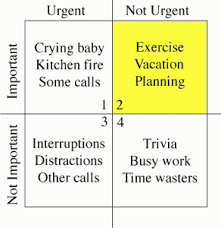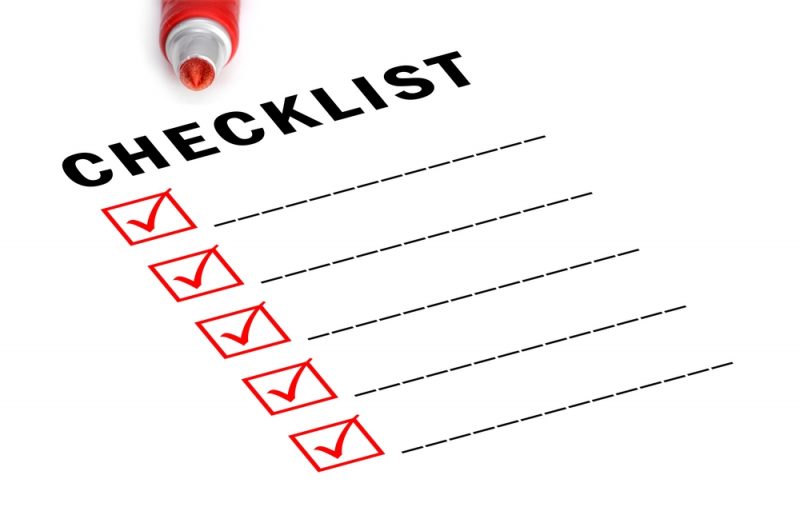As you begin to make your goals for 2016, consider adding some work-related items to your to-do list. And you might even want to add to-do lists to your to-do list (or maybe I’m the only person who does that). One great goal for the new year is determining how to become more efficient at work through better prioritization and less procrastination. But, how can you prioritize when seemingly everything is of utmost importance? And how can you end procrastination when you’re paralyzed by fear of your overwhelming to-do list? Here are some tips to get you started.
- Write down everything that is on your plate each night before you leave work. This includes even the small tasks. Don’t count on your brain to remember everything. Take a moment to look the list over and determine the three to five items that should absolutely be accomplished the following day. By planning the night before, you should find yourself better prepared to hit the ground running in the morning. Of course, there might be things that crop up overnight, which may require reevaluation of your most important tasks. But cross that bridge when you get there and make your evening list based in what you know at that time, not what might happen in the future. (There are some schools of thought that disagree with this method and believe that you should make your task lists when your mind is freshest, generally first thing in the morning. It’s important to determine what works best for you. For me personally, I sleep better at night knowing that I got everything out of my mind and onto paper before leaving work).
- Ask yourself what happens if you don’t complete the tasks on your list. One of the benefits of writing everything down is that you get to rationalize how important everything truly is. So, as you look at your tasks, if the answer to the question is “I’ll lose my job” or “I’ll let my team down” those are probably the things that need to make their way to the top of your list.
- Determine which tasks are actually the most critical. This can be done in a number of ways. First, think about the tasks that can only be completed that day. Next, think about how the task serves your team or a
 gency (for example, answering a co-workers question about refrigerator policy probably doesn’t help greater team or agency goals). If you are truly unsure, stop by and talk to your boss to find out what he or she is thinking. To divide your tasks into which should be completed first, consider taking a page out of President Eisenhower’s book. He was a master at dividing tasks into those that are important and those that are urgent. What’s the difference? Urgent tasks require immediate attention, while important tasks need to be completed and feed into a long-term goal or mission, but they don’t need to be completed right that second. Tasks can be both important and urgent, but usually they are not. Stephen Covey, the author of The 7 Habits of Highly Effective People used Eisenhower’s method to develop a decision matrix which I’ve included below.
gency (for example, answering a co-workers question about refrigerator policy probably doesn’t help greater team or agency goals). If you are truly unsure, stop by and talk to your boss to find out what he or she is thinking. To divide your tasks into which should be completed first, consider taking a page out of President Eisenhower’s book. He was a master at dividing tasks into those that are important and those that are urgent. What’s the difference? Urgent tasks require immediate attention, while important tasks need to be completed and feed into a long-term goal or mission, but they don’t need to be completed right that second. Tasks can be both important and urgent, but usually they are not. Stephen Covey, the author of The 7 Habits of Highly Effective People used Eisenhower’s method to develop a decision matrix which I’ve included below. - Lists! If you’ve read enough of my posts, you probably get the sense that I love lists. A lot. And for productivity, they can really be helpful. One prioritization strategy is to create four lists that you consistently update as needed and which list all of your goals/to-dos: a master list of all tasks, a monthly list, a weekly list, and a daily list. This method helps take some things off of your mind by properly prioritizing them into, for example, the monthly list rather than the daily list.
- Be realistic about both the time it takes to complete a project and the time you have available. No one truly expects you to be able to do it all. So as you are placing your most critical tasks on your to-do list, think about how much time they will actually take, and build in some buffer. And although it may be tempting, don’t schedule so many tasks that you would have to work for 20 hours straight to finish them all. Leave yourself time for sleeping, eating, commuting, taking a break, etc.
- Complete your hardest or least desirable task first. Each morning, when you get ready to conquer your list, first complete one task that you dread doing. This might be an uncomfortable meeting or a boring report. But you’ll find that by getting this out of the way first, you are more productive throughout the rest of the day.
- Determine whether the work on your to-do list is actually yours to complete. If it isn’t, delegate the task to someone else whenever possible.
- Establish a routine. Our brains work best when they are in a rhythm, so setting specific tasks to happen close to the same time each day can be beneficial in removing some of the procrastination and keeping you on track. For example, choose a time to eat lunch each day, a time to check emails, a time to return phone calls, etc. and stick to those times throughout the week. This also ensures that you aren’t breaking up your day and interrupting other tasks by constantly answering the phone or responding to every email as it comes in (see #12 for more on this).
- Prioritize tasks by level of effort required. After you’ve completed that one task in the morning that you dread, next look at your to-do list and determine which will require the most effort and order then accordingly. If you feel like you have the mental bandwidth, tackle those that will take the most effort first. As you begin to tire toward the end of the day, then look at the easier tasks.
- Stop being a perfectionist. Arguably, this is a difficult one for a lot of people because we tend to always believe that if given just a little bit more time, we could do a project so much better. But is that actually true? Produce your best work possible in the time you have allotted yourself, and then let that project go and move on to the next task without guilt.
- Prioritize backwards. Take your deadline and then work backwards, determining how long it will take you to complete that task so you know exactly when you need to start. Again, build in some margins to give yourself space for those fires that need to be put out or just in case the project takes longer than expected. To add to that, consider setting milestone deadlines along the way to project completion. This can help keep you on task and ensure that you aren’t saving everything until the last moment.
- Work through one task at a time and take it as far as possible. Multitasking is almost never the most efficient way to work. Every time you stop working on the task at hand to do something else, it will take you extra time to get back into the swing of things when you return to the original task. So instead, remain focused to save yourself that extra time.
- Be flexible. It doesn’t matter how well you prioritize, things won’t always work out as you intend. This might be because you are waiting for a response from a co-worker or had to attend to an unexpected project that your boss needs within the next hour. This is why it is so important to build buffer time into your task list each day.
- Consider microtasks. If you have a large project to complete, but you aren’t sure where to begin, avoid being paralyzed by fear and instead break it down into smaller steps that you can more easily complete.
- Don’t put off your personal goals. It’s very easy to put yourself last, especially when you have so many things on your plate. But it’s important that you take time for yourself to work toward your goals, do something fun, or just relax.
There are tons of prioritization, time management, and anti-procrastination strategies out there. What are some of your favorites? How do you ensure that you are as productive as possible each day?





# 6 is right on the mark. Don’t procrastinate, get it done and move on to the rest of the list knowing that the ‘worst’ is behind you.
Thank you for the tips – one of my personal ones is, anything I haven’t done that day gets moved to the following day’s to-do list and marked ‘2’. This continues until it gets done (i.e. if it’s been moved 4 days, it gets allocated ‘4’). I then try to do the highest numbered tasks first as I’ve been putting them off the longest.
That’s a brilliant tip!
I love this breakdown. My “plate” list is nearly two pages long already. I can see the need to prioritize and manage these tasks better.
and if you run into a stumbling black, or an excuse for procrastinating, move on to the next and the rest of list and go back to unfinished items
THANKS for this I really needed to see it and apply it ! I can see the need to prioritize and manage these tasks better.